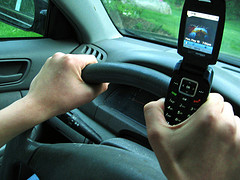
An editorial By Rachel Graubart
According to a study done at the University of Utah, “Distraction from cell phone use while driving (hand held or hands free) extends a driver’s reaction as much as having a blood alcohol concentration at the legal limit of .08 percent.”
Being that the average adolescent receives fifty text messages a day, it is important that teens are informed of the dangers of texting while driving. Many teenagers put themselves in potentially life-threatening situations, simply by using their cell phones while driving. Perhaps if more young adults knew how dire the consequences of distracting themselves while driving are, there would be fewer teens at risk of, and involved in, cell phone related accidents. Some schools offer information to students in wellness classes, but students should also hear about the hazards from other sources, such as television, internet, and other media outlets, so that they will be more likely to listen and react to statistics.
Although texting and talking while driving is very convenient, the ease of being in contact with friends and family is not worth risking your life. Other distractions, such as eating, putting on makeup, drinking, and reading, can impair a driver’s abilities, which can lead to crashes. “Nearly 80 percent of crashes and 65 percent of near-crashes involved some form of driver inattention within three seconds before the event,” according to a study done by the Virginia Tech Transportation Institute. Even in the case of an emergency, it is important that you do not let using your cell phone interfere with your driving ability. It is worth pulling over for a minute or two for an urgent call, rather than causing an accident, which would make the crisis worse.
Often times, people text while driving in order to save time. It is ineffective to do this because the distraction can cause a driver to miss signs, get lost more easily, and drive recklessly, leading them to be pulled over by a police officer. A University of Utah study said that, “Cell-phone drivers were more likely to miss traffic signals and often failed to see billboards and other signs in the driving environment.”
Others counter the argument that using a cell phone while driving is dangerous, by saying that driving under the influence is much, much worse. However, a study by the RAC Foundation concluded that the reaction times of drivers who sent text messages “deteriorated by 35 percent, much worse than those who drank alcohol at the legal limit, who were 12 per cent slower, or those who had taken cannabis, who were 21 per cent slower”. While drunk driving and driving under the influence of illegal drugs is very dangerous, the impairment caused by texting is worse and more likely to cause a crash.
In conclusion, using a cell phone while driving is not worth the risk of putting yourself in danger of severe injury, or even death. Media outlets should make an effort to inform teens, and older drivers, about the dangers. Young people are more likely to listen to sources they go to for entertainment, instead of hearing the information solely in a school environment or from other sources that are not of interest to them.






